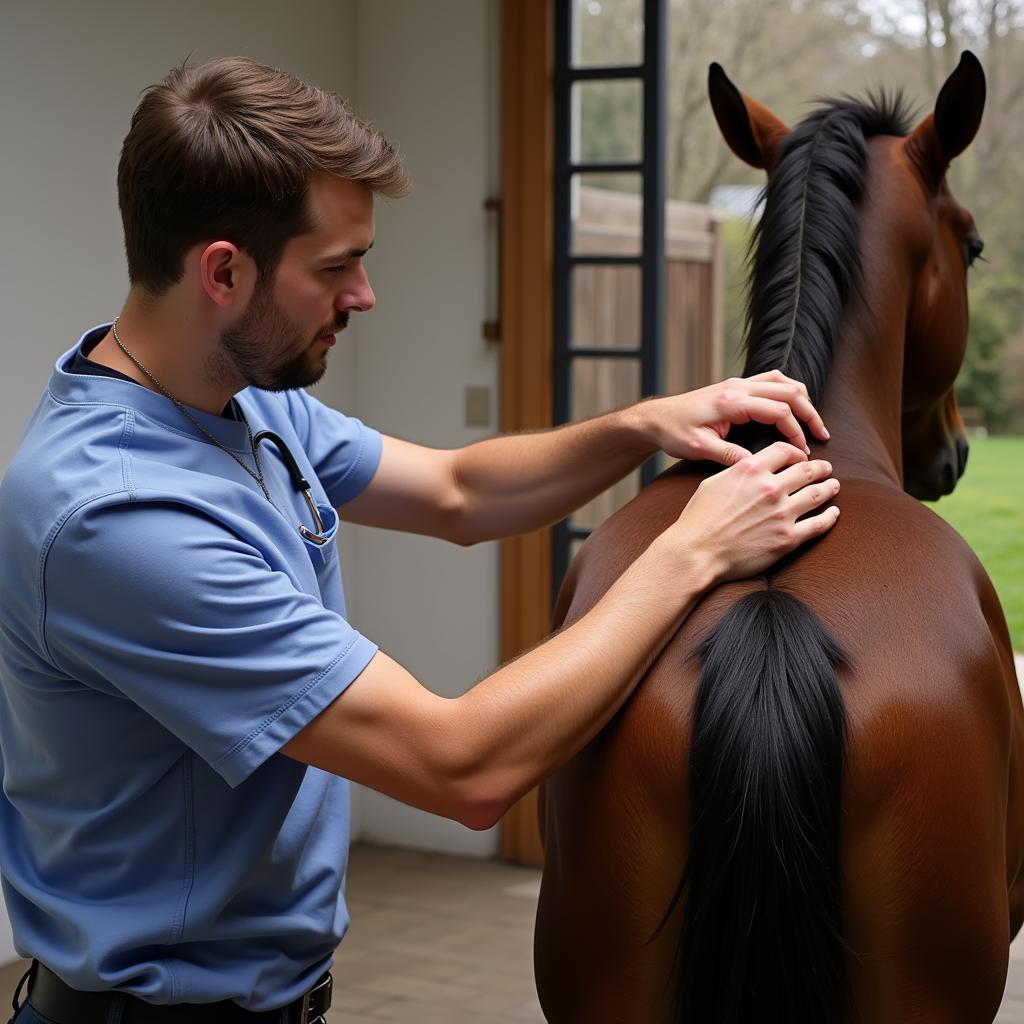The Back Of A Horse is a complex and crucial area, impacting everything from performance to overall well-being. Understanding its anatomy, recognizing potential issues, and implementing proper care are essential for any horse owner or enthusiast.
The equine back is a network of interconnected muscles, tendons, ligaments, and bones working in harmony to support the horse’s weight, facilitate movement, and connect the forehand and hindquarters. A healthy back is vital for a horse’s ability to perform athletic activities, carry a rider comfortably, and maintain overall balance and coordination. Common issues that can affect the back of a horse include muscle soreness, back pain, kissing spines, and arthritis.
Recognizing Signs of Discomfort in the Back of a Horse
Identifying potential problems early on is key to preventing serious complications. Subtle changes in behavior or performance can often indicate back discomfort. These signs might include reluctance to bend or turn, difficulty picking up a canter lead, changes in gait, a hollow or swayed back, sensitivity to touch, or general irritability. If you notice any of these signs in your horse, consult a veterinarian or equine chiropractor to determine the cause and develop a treatment plan.
Proper Care for the Back of a Horse
Caring for your horse’s back involves several key aspects. Regular exercise, a balanced diet, and a properly fitted saddle are all crucial. Incorporating exercises that strengthen the back muscles, such as hill work and lunging, can help prevent injury. Ensure your horse’s diet provides adequate nutrition for muscle development and maintenance. Most importantly, a well-fitting saddle distributes weight evenly and avoids pressure points that can cause pain and discomfort. You can find appropriate horse back riding pants on our website.
How Can a Properly Fitted Saddle Impact the Back of a Horse?
A saddle that fits poorly can create pressure points along the horse’s back, leading to muscle soreness, inflammation, and even long-term damage. A properly fitted saddle, on the other hand, distributes the rider’s weight evenly, allowing the horse to move freely and comfortably.
The Importance of Regular Veterinary Checkups
Just like any athlete, horses benefit from regular checkups to ensure their musculoskeletal system is healthy. A veterinarian can detect early signs of back problems and recommend preventative measures or treatment options. This is particularly important for performance horses or those with pre-existing conditions. Remember to also pay attention to your horse’s ears back on a horse as it can be an indicator of mood or discomfort.
 Veterinary Checkup for Horse's Back
Veterinary Checkup for Horse's Back
“A proactive approach to back care can significantly extend a horse’s athletic career and improve their overall quality of life,” says Dr. Emily Carter, DVM, specializing in equine sports medicine.
“Regularly checking your horse’s tack, especially the sit back halter for horses, can prevent many back issues,” adds John Miller, a renowned horse trainer with over 30 years of experience.
“Understanding the nuances of a horse’s back, including potential issues like horse dragging back feet, is essential for responsible ownership,” emphasizes Sarah Johnson, equine physiotherapist. Attending a southeastern charity horse show can also be a great way to learn more from experienced horse owners and professionals.
In conclusion, the back of a horse is a complex and vital area that requires careful attention and proper care. Understanding the anatomy, recognizing signs of discomfort, and implementing preventative measures are crucial for maintaining the horse’s health, well-being, and performance. By prioritizing back care, you can ensure your equine companion enjoys a long and comfortable life.
FAQ:
- What are the common signs of back pain in horses?
- How can I prevent back problems in my horse?
- What is the importance of a properly fitted saddle?
- When should I consult a veterinarian about my horse’s back?
- What exercises can strengthen my horse’s back muscles?
- What are the common treatments for back pain in horses?
- How can nutrition impact my horse’s back health?
Need help with your horse? Contact us at Phone Number: 0772127271, Email: [email protected] Or visit us at QGM2+WX2, Vị Trung, Vị Thuỷ, Hậu Giang, Việt Nam. We have a 24/7 customer support team.